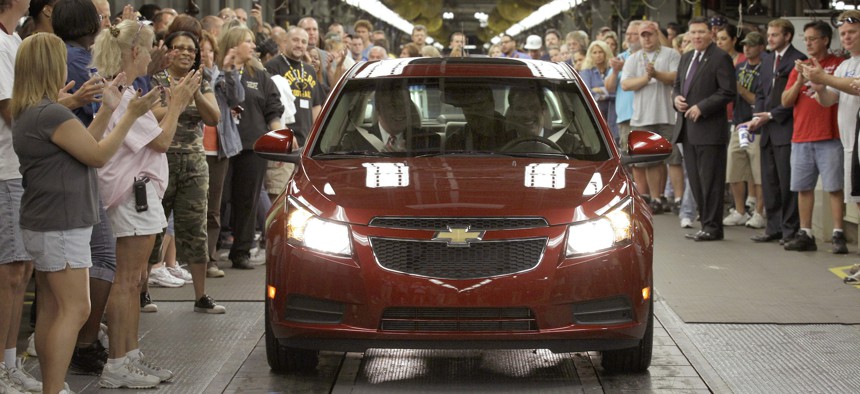Mayor Discusses Local Impacts of GM’s Newly Announced Plant Closures

In this file photo taken Sept. 8, 2010, General Motors workers cheer as the first Chevrolet Cruze compact sedan off the assembly line, at the GM factory in Lordstown, Ohio. Amy Sancetta / AP File Photo

Connecting state and local government leaders
“This isn’t just a GM issue. People aren’t buying cars” like they once did, according to Lordstown, Ohio Mayor Arno Hill. “We’ve prepared for this.”
While driving along the Ohio Turnpike between Cleveland and Youngstown, it’s hard to miss the massive 6.2 million square-foot General Motors assembly plant in Lordstown, which the Detroit-based automaker announced Monday is part of a North American restructuring plan that will cease production of certain passenger car models, including the Chevy Cruze.
Although the village of Lordstown, located in Trumbull County, only has about 3,200 residents, the GM assembly plant is a major employment center for the Mahoning Valley, which includes the cities of Warren and Youngstown.
According to GM’s announcement, assembly plants in Detroit and in Oshawa, Ontario will also be “unallocated” in 2019, as will transmission factories in White Marsh, Maryland and Warren, Michigan. The move by the automaker comes after a previous announcement to reduce production at Lordstown down to just one shift.
Overall, GM plans to cut nearly 15,000 workers in North America, including 8,100 white-collar jobs through buyouts and layoffs, bringing gloomy economic news for states like Michigan and Ohio.
“This isn’t just a GM issue. People aren’t buying cars,” Lordstown Mayor Arno Hill said on Monday during a press conference livestreamed by WKBN-TV at the United Auto Workers Local 1112 union hall. “You look across the board at Ford, Chrysler, General Motors, people just aren’t buying the cars.”
Hill noted that GM’s announcement did not say that the Lordstown plant is “permanently shuttered,” only that production would cease. “I am holding out” hope that GM will return to the Lordstown plant, which had been previously touted as a shining star during the company’s recovery from the depths of the Great Recession.
“We’re hoping for the best,” the mayor said. “We’re willing to work with them to do whatever it takes.”
But Hill said that he and other local leaders in Lordstown knew that something like this could very likely happen, since it’s happened before. “We’ve prepared for this. … We’ve tried to be proactive in the village.” In recent years, “we’ve tried to diversify because we realized across the board, we do need the jobs,” he said, citing a number of smaller- and medium-size companies that have located in Lordstown.
The mayor estimated that the GM plant closure will reduce income tax revenue in Lordstown by more than $1 million annually.
The mayor said the village has very little outstanding debt, so the fiscal impact shouldn’t shock the village’s budget, at least in the short term. “From a village standpoint, we’re going to be in a wait-and-see and see what happens. But as for having to scramble right now, the village should be OK for the short term. Long term, we have to may need to make some adjustments.”
Lordstown, the mayor said, has also crossed some major capital investments off the village’s to-do list. “We’ve maintained our fire department with new equipment” and installed new LED lighting. “When things are good, that’s where you take care of your expenses.”
But Hill said he has regional worries about smaller companies that supply the GM Lordstown plant. “The ripple effect is traumatic.”
Michael Grass is Executive Editor of Route Fifty and is based in Seattle.

NEXT STORY: When a Local Government is ‘Unwilling’ to Cover Debt Costs





